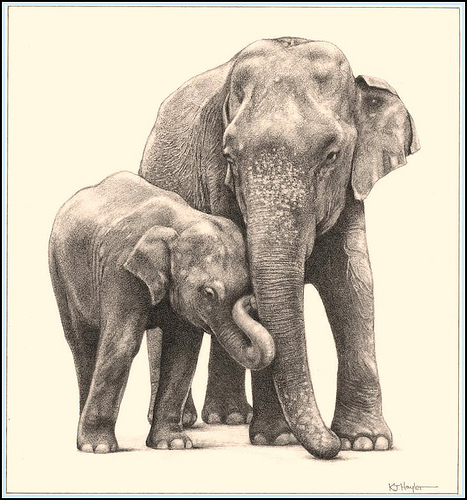
Picture courtesy of http://www.drawntonature.co.uk submitted by kjhayler
I am lucky enough to have grown up in a place where I was able to be close to nature and bare witness to some of the most remarkable animals on our planet.
I consider myself honoured to have been close to elephants, been charged by a rhino, stood eye to eye with a water buffalo, watched a pride of lions devour its kill. I’ve stroked a cheetah, albeit a baby one. I have listened to the hyena giggling outside our tent in the dead of night.
I’ve taken pictures of the cutest jackal (i never knew they were so small) and been scared witless by a puff adder crawling in our garden. One of the joys of living in Africa is being on the doorstep of some of the most spectacular game and natural beauty on the globe. Anyone that lives there knows it, anyone who visits it, knows it, and anyone that’s seen pictures of it knows it.
But this is the scary thing to me. The idea and thought that one day soon, all I will be able to look at to recall the magnificent creatures that I was once able to stand and watch roaming free, alive and wild is a picture like the one above, scares the hell out of me.
12 animals, slaughtered for nothing more than an ivory tusk by a gang of professional poachers???
When the hell did poaching become a professional occupation? In Africa poaching has always been a serious issue. Mainly due to its vast size and poverty stricken people. Give a man an opportunity to feed his family for a year without hassle and you have a powerful motivator in your hands to inspire anyone to commit the most heinous of crimes against our natural world.
The latest outrage to have made the press in a big way over here is an attack in Tsavo National Park in Kenya. A place where once over 30,000 elephants roamed free and wild, a place where now concern is so critical that a government is considering the formation of a national army to fight against poaching gangs. So is this the launch of an International war on Poaching?
The crazy thing is that we living in the Western world get outraged as we see these things happening around the world, yet 50 years ago, it was us doing similar things in the pursuit of an ivory trinket to adorn our mantle or line our necks. Furs, skins, heads, teeth, body parts. You name it, we’ve wanted it, pursued it, taken as we please. Even I am guilty of this. Leather jackets hanging in my cupboard. An ivory handled letter opener on my desk. Think about it, nearly everyone of us are in some way guilty of it.
Now as another part of our world comes into its time of wealth and prosperity, all those things that we enjoyed at the height of our time at the top, is now being craved by a whole new generation of people willing to pay the price to have the status symbols of success and power. And only now are we outraged by the senseless killing! Cites? An international treaty on the trade of endangered species? Hell it is a treaty without muscle and one that fails to go far enough to secure and ensure the safety of what little natural beauty this world of ours has left.
It is the incessant greed of mankind that will be the ultimate downfall of this planet. We won’t stop wanting what others around us have, until there is nothing left to want, and then even more. If is not the tusk of a Rhino to enhance our sexual performance then it will be the hide of some poor beast to line our boots and make our hand bags look pretty.
Of all the things that I miss from Africa, the outdoor beauty of the natural world is the biggest on my mind. I cherish the moments I’ve spent on safari, camping, exploring the vast open savannah plains. My heart cries out at the senseless killing of such a treasure trove of beauty, yet I know deep down it will not stop. One day, very possibly even in my lifetime, I will not be able to dream of returning to see and explore the beauty I remember from my childhood, and that my friends is criminal. If anyone has the right to expect to be left in peace and allowed to prosper and multiply it is the animals that do nothing other than to enhance and give great wealth to our natural world.
Woe are we, for we all have blood on our hands.
Thought for today – “Contentment is natural wealth, luxury is artificial poverty.” – Socrates
Song for today – Caribbean Blue by Enya
 When it comes to reporting the British Press have perfected the art of bearing all in the national interest. The biggest question I believe lies in what is really in our interest, and what is to our detriment.
When it comes to reporting the British Press have perfected the art of bearing all in the national interest. The biggest question I believe lies in what is really in our interest, and what is to our detriment.